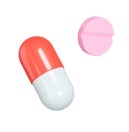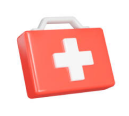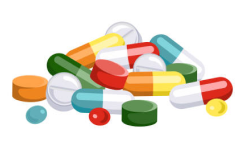Uses
What is Rivaroxaban (Xarelto) for?
Rivaroxaban is a blood thinning medication that prevents blood clots from forming in your body. It does not remove clots that are already formed, but prevents these clots from becoming bigger.
You may be given Rivaroxaban for:
- Treatment or prevention of Deep Vein Thrombosis (blood clot in the legs) or Pulmonary Embolism (blood clot in the lungs)
- Prevention of stroke in Atrial Fibrillation, a condition where there is irregular heart rhythm
- Prevention of blood clot formation after a hip or knee replacement operation
- Reducing the risk of heart attack and stroke if you have Coronary Artery Disease (a blockage in the blood vessels to your heart) or Peripheral Artery Disease (a blockage in the blood vessels to your limbs)
The length of treatment may range from a few weeks to long term.
How should I take or use Rivaroxaban (Xarelto)?
- Do not stop taking your medication without checking with your healthcare professional.
- If you are taking 2.5mg or 10mg tablets, take this medication with or without food.
- If you are taking 15mg or 20mg tablets, take this medication after food.
- If you are unable to swallow the tablets whole, you may crush the tablets and mix with water immediately before taking it.
What should I do if I forget to take or use Rivaroxaban (Xarelto)?
If you take the medication once a day
- If you forget to take a dose, take it as soon as you remember. Then take your next dose at the usual time the next day. Do not take more than one dose in a day to make up for the missed dose.
If you take 15mg two times a day
- If you forget to take a dose, take a dose immediately to ensure a total of 30mg is taken per day (in this case, two 15mg tablets may be taken together). Continue taking the medication the next day as per usual. Do not take more than two 15mg tablets in a day.
Precaution
What precautions should I take when taking or using Rivaroxaban (Xarelto)?
- Inform your healthcare professional if you are allergic to this medication or any of the other ingredients of this medication
- There is no need to make drastic changes to your lifestyle. However, avoid sports or activities that may cause you to get injured.
- See a doctor if you have any fall or injury to any part of your body.
- Inform all doctors, dentists and pharmacists that you are on Rivaroxaban. There may be a need to stop the medication for a short period of time if you are going for a surgery or medical procedures such as an endoscopy or dental treatment.
- Inform all doctors, dentists and pharmacists that you require an injection into the musle.
- Inform your healthcare professional if you are pregnant, planning to become pregnant or breastfeeding..
What food or medication should I avoid when I take or use Rivaroxaban (Xarelto)?
Consult your healthcare professional before you take any other medication (either prescription or over-the-counter), nutritional supplements or herbal remedies. Some of these medications or supplements can affect the way Rivaroxaban works.
Examples of medications or supplements that may affect Rivaroxaban:
- Antibiotics for tuberculosis (e.g. Rifampicin)
- Medications to treat fungal infections (e.g. Itraconazole)
- Seizure medications (e.g. Carbamazepine, Phenytoin)
- St John's Wort
Side Effects
What are some common side effects of Rivaroxaban (Xarelto)?
- Take your medication after food to minimise these symptoms.
- Inform your healthcare professional if these symptoms do not go away.
You may experience other forms of bleeding such as gum bleed when brushing teeth, unexplained nose bleed, or get bruises more easily.
- See a doctor if bleeding does not stop within minutes or if you feel unwell.
- Use a soft toothbrush and floss your teeth gently .
- Use an electric shaver instead of a blade.
- For women, it is common to have increased menstrual flow but check with your doctor if you feel unwell.
See a doctor immediately or go to the hospital if you have any of the following symptoms that may indicate internal bleeding, such as:
- Black, sticky, or bloody stools
- Coughing up blood or brown material
- Unexplained bruises or purple areas on skin
- Blood in urine
- Severe headache that does not go away
- Sudden giddiness or confusion
- Sudden stomach pain
- Sudden backache or joint pain
- Shortness of breath
If you experience any one or more of the drug allergy symptoms below, you should stop your medication and see your healthcare professional immediately.
- Swollen face/eyes/lips/tongue
- Difficulty in breathing
- Itchy skin rashes over your whole body
Blood clots may still form while you are taking Rivaroxaban. The signs and symptoms depend on the site where they are found. See a doctor immediately or go to the hosptal if you experience:
- Symptoms of deep vein thrombosis such as leg swelling, redness, pain, warmth or numbness
- Symptoms of pulmonary embolism such as chest pain, shortness of breath, coughing up blood
- Symptoms of stroke such as muscle weakness, difficulty talking, blackouts, giddiness, blurred vision, facial drooping
Handling
How should I store Rivaroxaban (Xarelto)?
Store the medicine in a cool, dry place away from heat, moisture and direct sunlight. Keep this medication away from children.
How do I throw away Rivaroxaban (Xarelto) safely?
Pack this medication into a black trash bag and seal it tightly before throwing into the rubbish chute or bin.
Other Languages

Rivaroxaban (Xarelto) in Mandarin Chinese

Rivaroxaban (Xarelto) in Bahasa Melayu
Disclaimers
If you take more than the recommended dose, please seek medical advice immediately. The information provided on this page does not replace information from your healthcare professional. Please consult your healthcare professional for more information.
This article is jointly developed by members of the National Medication Information workgroup. The workgroup consists of cluster partners (National Healthcare Group, National University Health System, and SingHealth), community pharmacies (Guardian, Unity, and Watsons), and the Pharmaceutical Society of Singapore. The content does not reflect drug availability and supply information in pharmacies and healthcare institutions. You are advised to check with the respective institutions for such information.
Last Updated on March 2021

Need More Medicine?
Use Medicine Order Service on HealthBuddy.

Medicines Reminder
Get reminders and chart progress on HealthBuddy.
Related Medicines or Drugs

















